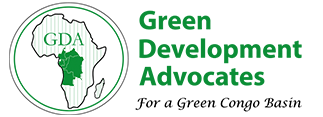Phone:
Newsletter
Green Development Newsletter : SPECIAL EDITION GDA 2025 Mid-year (January – June) Significant changes
SPECIAL EDITION GDA 2025 Mid-year (January – June) Significant changes
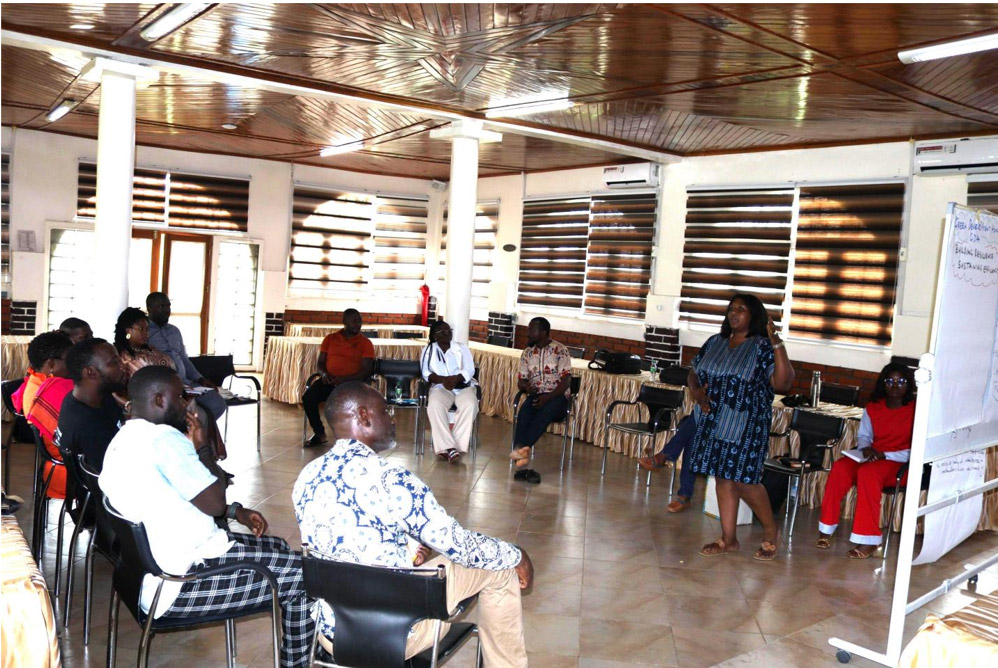
Setting the pace
The pace was set at the GDA Kribi 2024 end of year evaluation retreat (January 5 – 12 2025) on the theme: “journey towards sustained efficiency”. The echo still continues to reverberate at mid-year 2025 as the organization remains poised to pursue its mission with greater determination in building resilience to sustain efficiency across the year.
GDA’s mission to contribute to the sustainable development of African tropical forests increases in intensity through the activities of its four main aareas of intervention:
- Securing and recognizing land and forest rights as well as the traditional governance systems and the amelioration of the subsistence level of indigenous peoples and local communities;
- Promoting forest governance and the sustainable management of other natural resources.
- Addressing problems relating to climate change and the promotion of low carbon emission economy;
- Contribute in building the capacities of stakeholders, communication and resource mobilization.
At mid-year, it was about time to evaluate the various consolidated actions undertaken and highlighting the significant changes observed as a result.
AXIS 1: Land rights, traditional forest governance and amelioration of subsistence level of Indigenous People and Local Communities (IPLCs) .
Baka and Bagyelli Cultural revival
GDA organized community-based discussions with Baka and Bagyeli elders and youths to explore traditional governance structures, cultural practices and the generational disconnect.
Today, the elders of these communities are now talking about their cultural erosion caused by youth disinterest and external influences. Attempts have now been initiated to reverse the trend by the communities themselves with some of the elders voluntarily opting to lead a cultural revival initiative intended to showcase during the 2025 World Indigenous People Day. This is a foundation that has been laid for building internal cultural leadership amongst indigenous people.
Nkoleyeng Community Forest Review
GDA conducted a field mission to Nkoleyeng to understand the post-project situation of the Nkolenyeng community forest and engage the community on their vision and legal preparedness.
This mission now throws more light on the preoccupations of the community which now expresses an urgent need to renew the convention1 due to expire this year. They hold strongly the idea that forest protection is undoubtedly tied with territorial defense and have expressed an urgent need to renew the convention which expires ending 2025. The community has been emphasizing that the community forest scheme is a significant breaker to attempts by state and private actors to expropriate community lands in the area.
The visit provided a reawakening of local ownership and initiated new visioning for traditional forest governance.
Awareness raising of 2024 forestry law to local communities
A workshop with communities and Civil Society Organizations (CSOs) to raise awareness on the forest law reform, identify local priorities, and support the drafting of a letter of intention to MINFOF requesting participation in the legal reform process took place in …..
The workshop strengthened community and CSOs understanding of the legal frameworks related to forest tenure and governance. It also enabled participants to engage in the ongoing reform process. It empowered them to identify and articulate community-driven priorities concerning land and forest access, resulting in the co-production of a joint letter of intention submitted to the Ministry of Forestry and Wildlife (MINFOF). This letter served as a formal entry point for IPLCs and civil society actors to participate in national forest law reform. Overall, the initiative has reinforced the legitimacy of Indigenous and community voices in legal advocacy and policy dialogue.
Presentation de la cartographie participative Kikot-Mbébé
A participatory area mapping of KIKOT-MBEBE is intended to highlight the extent to which the construction of the projected hydro-electricity dam is going to impact on the communities and to enable the stakeholders to find solutions to the pre-occupations of those to be affected.
Lors d’une réunion de présentation des cartes avec les parties prenantes du barrage de Kikot-Mbébé a Bot Makak dans la Sanaga Maritime, les communautés ont afficher beaucoup plus de confiance à travailler avec GDA vue l’engouement qu’ils ont montre pendant ces assisses.
La réunion avait été apprécié par les différentes parties prenantes au point où ils ont sollicité d’autres rencontres de ce genre. Les communautés ont pu exprimer sans crainte devant les autorités.
Cette réunion a aussi consolidé un renforcement de la solidarité entre les communautés impactées et en plus, les représentants des communautés reconnaissent l’importance de la présence et du rôle de GDA dans ce processus.
Survey analysis of the KHPC complaint mechanism
The complaint mechanism is one of the conditionalities proposed by funding institutions of mega projects as safeguards to a transparent implementation of development projects. In the case of the Kikot power project, the company has instituted a complaint mechanism process to which GDA engaged a study to find out whether the process was effective.
L’étude a été appréciée par les différents participants et KHPC a reconnu que les résultats de cette étude été vrai et a promis intégrer les recommandations de GDA dans leur mécanisme de plainte qui est en révision.
Les communautés sont conscientes des impacts du projets et commencent à comprendre qu’elles ont les droits de revendiquer et de dénoncer ce qui ne va pas.
Aussi l’entreprise KHPC et même les autorités administratives sont devenues moins méfiante à l’égard du travail de GDA dans le suivi de la mise en œuvre du projet depuis lors.
Une confiance qui fait tache d’huile dans la région et pousse les groupes représentatifs des communautés Bassa tels que ADNA qui souhaitent être impliqués dans les activités de l’organisation.
Sauvegarder la foret communautaire (FC) Djoko
La FC Djoko se situe dans la concession forestière octroyé pour l’extraction de fer a la Société CAM-IRON. Il est donc question d’éjecter le foret communautaire de Djoko a qui l’état a attribué un titre foncier en premier avant qu’il ne fasse à la société minière exploitant le fer de Mballam. Cela pose un problème juridique sur le principe de préséance dans la possession des titres fonciers, C’est aussi les droits constitutionnels concernant les peuples autochtones qui sont bafoues.
Il était donc devenu impératif de mobiliser les médias et la société civile pour sauvegarder le FC Djoko et ceci a portée fruit. La voix des communautés autochtones de Se’eh et Assoumindele portée par les médias a amené le MINFOF à diligenter une réunion de concertation pour écouter les préoccupations des Baka.
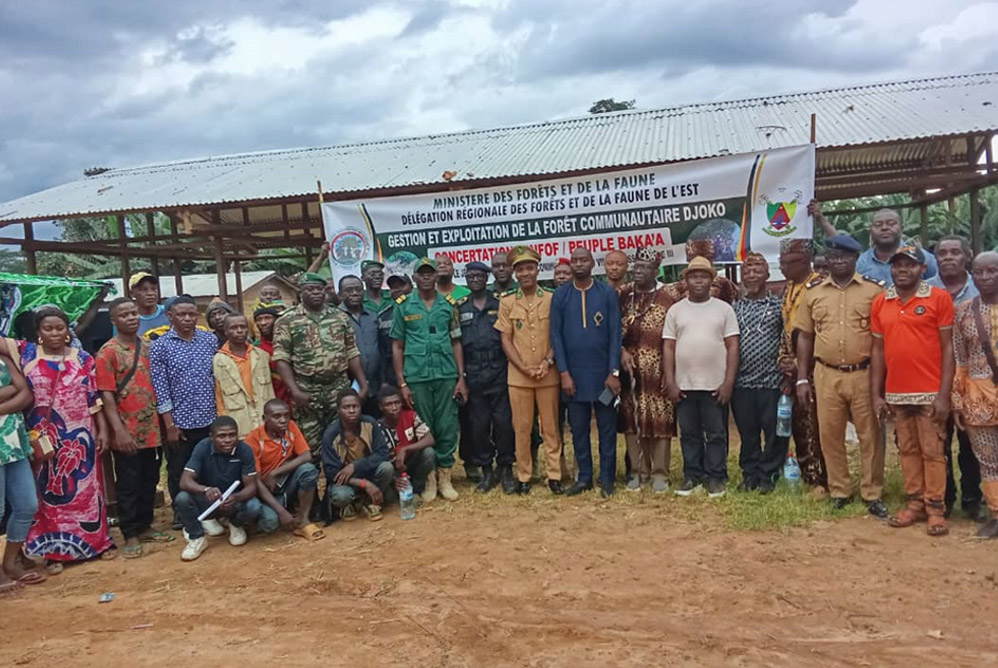
Documenter les illégalités des concessions à Apouh
The Apouh a ngong community in the Sanaga Maritime is beyond all doubts being asphyxiated by the agro-industrial company of SOCAPALM. The proliferating population now has very little space to survive hence their clamour for some vital space to which they are rightfully entitled. Their plea however is not heeded both by the company as well as the administration notably abetting the actions of SOCAPALM.
Les illégalités de la problématique foncière de Apouh ont été documentées dans une analyse y compris les illégalités de la répression des manifestations culturelles des communautés
Discussion avec les communautes sur les changements operes dans leur localite exprimes via des photographies .
Communicating about social and environmental problems and probably, any consequent changes that may occur within the immediate environments of communities is not the monopoly or the exclusive responsibility of reporters coming from out of that environment. It is about time the local population took it upon themselves to reach out to the masses through photographic captures especially as concerns situations related to the conversion of forests. These photographs may help quite much in providing reliable evidence against exploiters trying to give different narratives concerning their activities within the area.
Social and environmental changes relating to forest conversion are therefore by these photographic captures revealed and made known to the world at large because in several situations a single picture narrates as much about an issue than imagined.
Follow up of the activities of AFRIS CAMPO
The “Association AFRISC Campo” is a women association in the Campo area mentored by GDA to empower them in several domains very essential for their livelihood. One of the significant achievements of this initiative is their ability to now engage in saving schemes that would help them to save for the rainy day. Just within a period of six months, the association has been able to realize a 20% increase in their rotating fund. Other activities like the sale of Menthol, liquid soap and Eau de Javel has helped to increase the savings.
Campaign against regressive projects funded by the African Development Bank (AfDB)
The war cry for the past months by the #Womin# sponsored “Right to Say No” campaign has been to clamour for an end to the funding of the so-called development projects that are not helping African countries to progress. The target is the African Development Bank which funds most of these projects and which are focused mostly on accumulating profits to the detriment of the general welfare of African populations and especially the Women communities which are the main caretakers of families.
GDA a organisé la réunion du comité de pilotage de la campagne ciblant la #BAD# avec la participation de 16 femmes des communautés et des OSCs de 5 pays d’Afrique centrale et de l’Ouest. Au cours de cette réunion, une visite de solidarité et d’échange a été effectuée à Mebassa auprès de plus ou moins 50 femmes de AVEFDRIP.
Cette réunion a permis de planifier les actions à mener pour dénoncer le mauvais financement de la BAD dans chaque pays membre du comité de pilotage au cours de l’année 2025. La visite d’échange effectuée lors de cette réunion a donné plus de courage et d’engagement a ces femmes qui ont en plus compris qu’il y a d’autres femmes qui vivent plus au moins les mêmes impacts de ces projets.
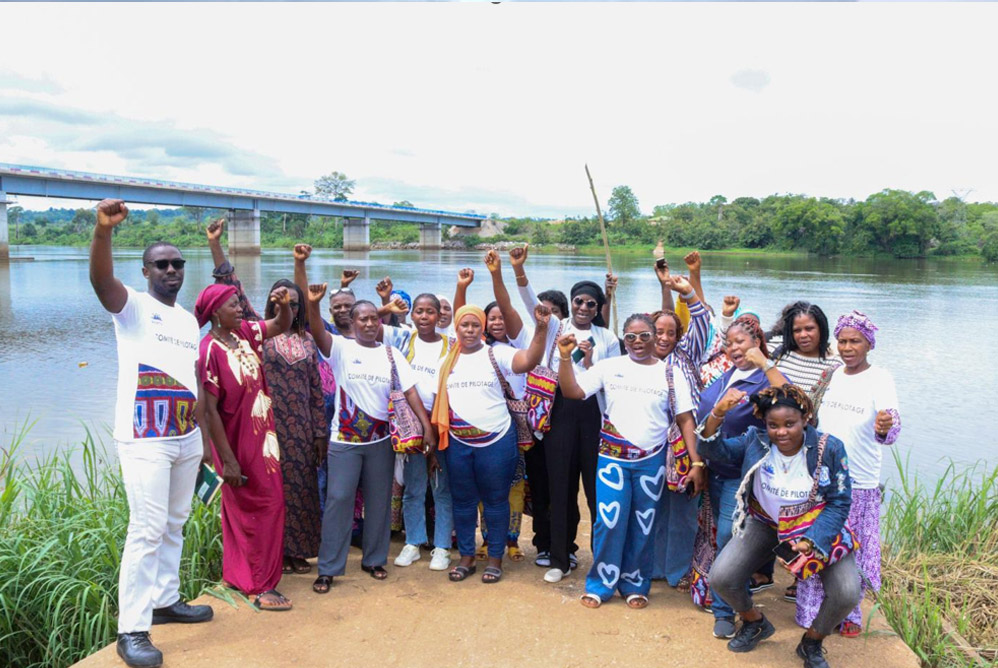
Reviving ritual hunting for indigenous communities
A significant development of the new law on Forestry and wildlife promulgated in Cameroon has been the legalisation of ritual hunting for indigenous communities whose introduction into the legal arena was thanks to the concerted efforts of civil society organizations led by GDA.
Le 24 juillet 2024, l’Etat du Cameroun a adopté la loi n° 2024/008 portant régime des forêts et de la faune. A date, GDA a informé 325 représentants d’OSC (membre du RACOPY) et communautés locales et autochtones sur les innovations (chasse rituelle, APC, TCC) et les limites de ladite loi dans les localités de Djoum, Mintom, Mambele, Akom II, Mambelé et Lomié, Salapoumbé.
Les OSC notamment le #RACOPY# s’est engagé à expérimenter la chasse rituelle dans le paysage Sud-Est afin d’influencer l’élaboration d’un texte spécifique sur la chasse rituelle au Cameroun.
AXIS 2: Forest governance and sustainable management of resources
Mobilization of indigenous groups to have their say in the elaboration of the Decree of application of the 2024 forestry law
En marge de la 79e Assemblée Générale du Réseau, Recherches, Actions Concertes Pygmees (RACOPY), GDA a facilité une concertation de ces membres pour contribuer à l’élaboration du décret d’application de la loi n° 2024/008. A l’issue de cette concertation, les membres du RACOPY ont élaboré une lettre à l’attention du Ministre des Forêts pour demander la participation du RACOPY dans le processus d’élaboration du décret de la loi n° 2024/008.
Natural Resource Management in COVIMOF
GDA has been engaged with COVIMOF community forest with the focus on assessing governance status and opportunities to shift toward sustainable, income- generating activities. The community, facing administrative and financial limitations, shifted from timber harvesting to fish farming and agroforestry. They had reforested 14 ha since 2014 and stopped. GDA’s visit re-engaged local governance actors and revealed readiness for alternative income models rooted in ecological protection, restoration, and sustainable livelihoods.
Corporate Social Responsibility undermined in CAMVERT
A multi-stakeholder workshop was organized in Kribi with chiefs, elites, youth representatives, notables, and other community members from Campo to review the corporate social responsibility (CSR) commitments of CAMVERT.
The workshop significantly increased community awareness by unveiling the hidden clauses of the corporate agreement with CAMVERT, sparking demands for transparency and clearer forest and land benefit provisions. This awakening led to strong community mobilization, particularly among the youth, who protested and were demanding reparations. These actions were met with a heavy-handed government response involving an intervention of the military.
GDA in solidarity issued a public statement condemning the repression, advocating for environmental justice, community rights, and the release of detained youths. The situation drew national media attention, prompting the central government to act by mandating a crisis tripartite meeting between the community, CAMVERT, and local authorities.
Faciliter une rencontre entre les PA et le Conseil Régional du Sud
A move undertaken by GDA to domesticate the plight of indigenous people and local communities within the immediate administrative and political decision-making arenas where the need for greater support is strongly needed to effect change.
Des points de contact ont été pris avec les responsables de CR du Sud
Le Conseil régional est favorable à une session d’information sur le code minier, les finances climatiques et pour des éclairages juridiques.
AXIS 3: Climate change and promotion of low carbon emission economies
GDA’s work contributes to climate change mitigation and adaptation by trying to strengthen community-based forest governance, promote reforestation and support sustainable alternatives to extractive land use such as agroforestry, agroecology, and NTFPs. We empower indigenous people and local communities to secure land tenure and co-manage forests thereby enhancing local stewardship of ecosystems critical to carbon storage and biodiversity. Participatory visioning and forest planning activities such as helping the communities to initiate the new forest management vision focused on preservation and autonomy which is directly tied to carbon sink protection while GDA’s participation in the forest basin congress in Brazzaville supported indigenous led climate declaration “the answer is us” which advocates for direct climate finance and recognizes IPLCs as key climate actors.
Participation in Forest Basin Congress in Brazzaville
GDA was part of a high-level indigenous people delegation that issued the “Answer is us” declaration demanding direct climate finance. The congress confirmed indigenous people’s leadership in climate action and raised GDA’s visibility among regional and international funders.
Promoting gender equity
GDA integrates gender equity by intentionally creating space for women and youths to participate in governance dialogue and community planning processes. Through its field missions and workshops, GDA raises awareness for the structural inclusion of women in traditional ans legal decision-making arenas while encouraging inter-generational learning and inclusion. The emphasis is also laid in involving women in land use planning, as well as forest and advocacy efforts especially within indigenous communities. GDA enhances their visibility and leadership in shaping environmental governance. These efforts address gender disparities while fostering inclusive development models where women and youths are recognized as key agents in sustainability and climate resilience.
World Biodiversity Day
30 women of AFRIS Campo come-together to celebrate world biodiversity day. They were given lectures on the notion of biodiversity. The took the engagement to plant trees especially those considered as endangered species.
L’etude sur le niveau d’implication des OSC et Communautés locales à la mise en œuvre des projets PNACC et CDN a Yoko et Garoua.
La situation sur le niveau des mises en œuvre des projets PNACC et CDN au Cameroun démontre que l’ensemble des projets climatiques (reboisement, adaptation aux changements climatiques) n’est pas forcement inspires des projets des politiques climatiques du Cameroun.
La mise en lumières des lacunes de l’administration en charge de l’élaboration de la mise en œuvre des projets climats.
Axis 4 : Building Capacities
Renforcement des capacités des femmes potentiellement impactées de Barrage de KIKOT-MBEBE
GDA et son organization partenaire WOAC, ont parcouru huit communautés potentiellement impactées par le projet de construction du barrage de Kikot Mbebe afin de renforcer les capacités des femmes de ces communautés sur les sauvegardes des potentiels financier du projet (Banque mondiale et BAD) et sur leurs droits. De même lors de la préparation des communautés pour la présentation des cartes nous avons profité pour renforcer leurs capacités sur les impacts potentiels du projet et sur leurs droits. Les femmes s’intéressent et s’impliquent de plus en plus aux activités de GDA sur le terrain.
Information guide on forest rights of IPLCs in the new Forestry Law published
Rédaction et distribution d’un guide d’information sur les droits des communautés locales et les peuples autochtones dans la gestion des ressources naturelles.
Ce document aidera a renforcer leur connaissance sur leurs droits dans la gestion des ressources naturelles
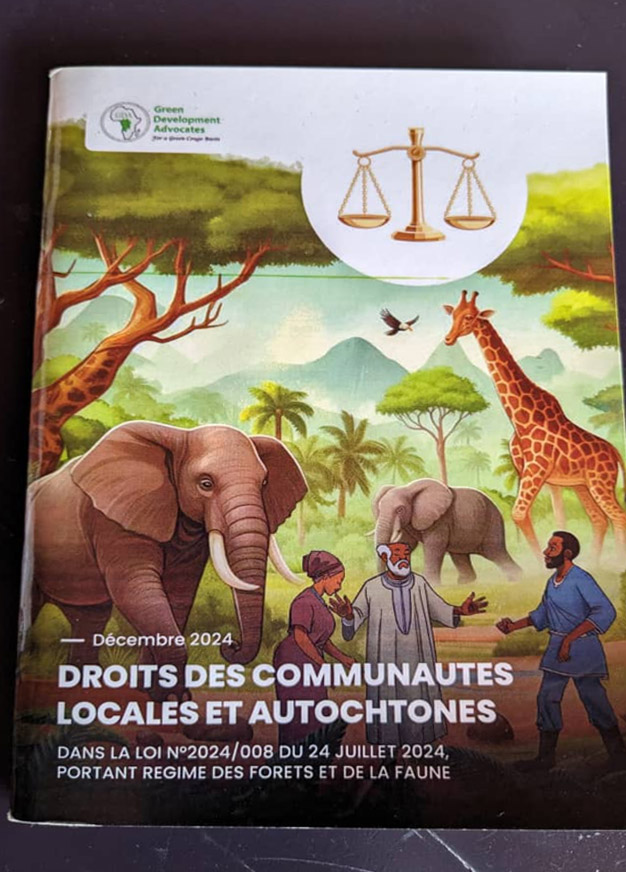
Rédaction aussi d’un document de capitalisation des besoins des petits producteurs de cacao et présentation de ce document aux petits producteurs. Ces petits producteurs ont pris connaissance du document, l’ont approprié et souhaitent l’améliorer pour qu’il soit utilisé pour influencer les processus en cours dans la mise en œuvre du RDUE (European Union Deforestation Rules). Des signes précurseurs de développement de la confiance des petits producteurs envers GDA.
Production et distribution des guides de formation sur les pratiques agroecologiques et autonomisationdes femmes
25 femmes de l’association AFRIS Campo ont mis en pratiques des formations sur les pratiques agroécologiques, ceci pour renforcer l’autonomie des femmes de l’association et améliorer les bonnes pratiques agroécologiques des communautés.
Experience sharing and learning visit of Senegalese Women in Cameroon
25 women from Senegal coming from the impacted communities of extractive industries met to share their experiences on the ordeals they go through in the face of extractive activities carried out by multinational companies in their respective countries. It was a moment also to exchange views on the strategies they could adopt in mitigating the nefarious effects of those activities.
